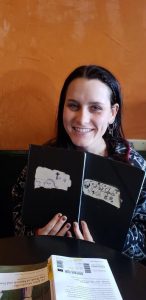The Life of an English Major’s Journal: An Interview with Koada Heacock ’20
Contact
The Words: Macalester's English Student NewsletterSenior Newsletter Editors:
Birdie Keller '25
Daniel Graham '26
Callisto Martinez '26
Jizelle Villegas '26
Associate Newsletter Editors:
Ahlaam Abdulwali '25
Beja Puškášová '26
Sarah Tachau '27
Peyton Williamson '27
By Ash Ma ’21
Consider this question: when was the last time you wrote down a sentence of your thoughts on a piece of paper?
Today? Last week? Last semester? Or…never?
If you haven’t developed the habit of writing in the blue/black English major’s journal yet, more often than not you are likely not to do it at all… But don’t miss out on the opportunity of recording the decision-making process behind your actions — they are all about the trivial details in your life!

Creative writing major Koada Heacock ’20 (she/her/hers or they/them/theirs), who is from the piney mountain valleys of Montana, has absolutely proved this point: writing in journals is a life-changing experience. She has developed a brilliant system of efficiently transforming her English major’s journal into something BIG and AMAZING — two capstone projects! I was excited to interview Koada and learn more about her story behind the scenes.
Koada was enjoying a cup of coffee and busy writing while I grabbed a hold of her in the English lounge. A pen, guided by her right hand, moved fast across her second English major’s journal, whereas those shimmery purple nails of her left hand helped to stabilize the pages. Sitting across the table, I saw her elongated letters curve into music notes. It was a purely pleasant thing to see.
Koada switched her major from Computer Science to English during her Junior year. “I just want to write,” she said, “writing poetries helps me tackle emotional difficulties.” After declaring an English major, Koada immediately started her first journal entry in February 2019 with a rough idea of her novel, Coyote Vicious, which later was developed into a magical realism capstone project.
Later, she continued her creative writing journey and, encouraged by Professor Andrea Kaston Tange, she materialized a chapbook, Rat Fuck Footprints, for another capstone class. I was amazed by the extensive amount of writing she had done. Upon request, she told me her secrets: “Sometimes I just write down random poetries in class, or anywhere really, and later I will pull stuff directly from my journal.”
The raw thoughts of random or even bizarre ideas may not make any sense at the beginning, but they are like fuels that you can store up for future use. Besides poetry, she also incorporated doodles, scenes from plays, and diaries into her journal to enrich her life experience. Koada said these writings not only facilitated in compiling her chapbook but also in overcoming hardships in life. For example, it was also a way to grant her an escape from negative emotions that were caused by an abusive partner.
By the time she finished the entire project, she felt exceedingly relieved. “I am so much better,” she signed with a smile. It was exhausting but effective; it was a self-help tool for mental difficulties. Koada realized that healing and reflection came along with a sense of self-actualization. Although it was unintentional, keeping a journal helped to rip off her grief that was embedded in family traumas and unpleasant moods caused by the interactions between humans.
During the meantime, journaling makes people face up one’s own demons — Koada accepted the fact that she couldn’t be as organized as the average Mac kid, but why so speedy? What’s the point? Take your time and write stuff that may not make a difference at the present moment, but in the long run, you will see the pay-off.
Folks, listen to Koada’s suggestion: “Writing journals is Good For You. You should all start using it.” Thank you for letting more people see the benefits of doing it. Here are her favorite quotes from her journal so far:
“old man. Oliva skin, well manicured mustache, smoking ciggies & doing scratch offs.”
“it’s xmas tomorrow. which u loathe. bring it on.”
Bring it on and write your own journal.